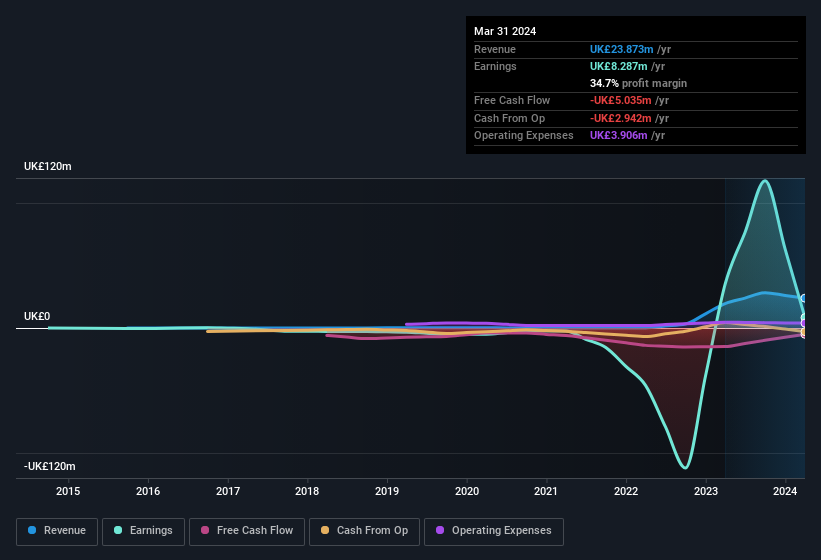- United Kingdom
- /
- Oil and Gas
- /
- AIM:ANGS
Angus Energy's (LON:ANGS) Shareholders Have More To Worry About Than Only Soft Earnings

Angus Energy plc's (LON:ANGS) recent weak earnings report didn't cause a big stock movement. We think that investors are worried about some weaknesses underlying the earnings.
Check out our latest analysis for Angus Energy

Examining Cashflow Against Angus Energy's Earnings
As finance nerds would already know, the accrual ratio from cashflow is a key measure for assessing how well a company's free cash flow (FCF) matches its profit. The accrual ratio subtracts the FCF from the profit for a given period, and divides the result by the average operating assets of the company over that time. This ratio tells us how much of a company's profit is not backed by free cashflow.
That means a negative accrual ratio is a good thing, because it shows that the company is bringing in more free cash flow than its profit would suggest. While having an accrual ratio above zero is of little concern, we do think it's worth noting when a company has a relatively high accrual ratio. Notably, there is some academic evidence that suggests that a high accrual ratio is a bad sign for near-term profits, generally speaking.
For the year to March 2024, Angus Energy had an accrual ratio of 0.26. We can therefore deduce that its free cash flow fell well short of covering its statutory profit. Over the last year it actually had negative free cash flow of UK£5.0m, in contrast to the aforementioned profit of UK£8.29m. Coming off the back of negative free cash flow last year, we imagine some shareholders might wonder if its cash burn of UK£5.0m, this year, indicates high risk. Unfortunately for shareholders, the company has also been issuing new shares, diluting their share of future earnings.
Note: we always recommend investors check balance sheet strength. Click here to be taken to our balance sheet analysis of Angus Energy.
In order to understand the potential for per share returns, it is essential to consider how much a company is diluting shareholders. As it happens, Angus Energy issued 23% more new shares over the last year. As a result, its net income is now split between a greater number of shares. Per share metrics like EPS help us understand how much actual shareholders are benefitting from the company's profits, while the net income level gives us a better view of the company's absolute size. Check out Angus Energy's historical EPS growth by clicking on this link.
A Look At The Impact Of Angus Energy's Dilution On Its Earnings Per Share (EPS)
Angus Energy was losing money three years ago. Even looking at the last year, profit was still down 76%. Sadly, earnings per share fell further, down a full 81% in that time. Therefore, one can observe that the dilution is having a fairly profound effect on shareholder returns.
In the long term, if Angus Energy's earnings per share can increase, then the share price should too. But on the other hand, we'd be far less excited to learn profit (but not EPS) was improving. For the ordinary retail shareholder, EPS is a great measure to check your hypothetical "share" of the company's profit.
Our Take On Angus Energy's Profit Performance
As it turns out, Angus Energy couldn't match its profit with cashflow and its dilution means that shareholders own less of the company than the did before (unless they bought more shares). Considering all this we'd argue Angus Energy's profits probably give an overly generous impression of its sustainable level of profitability. With this in mind, we wouldn't consider investing in a stock unless we had a thorough understanding of the risks. Case in point: We've spotted 5 warning signs for Angus Energy you should be mindful of and 2 of these bad boys make us uncomfortable.
In this article we've looked at a number of factors that can impair the utility of profit numbers, and we've come away cautious. But there is always more to discover if you are capable of focussing your mind on minutiae. Some people consider a high return on equity to be a good sign of a quality business. So you may wish to see this free collection of companies boasting high return on equity, or this list of stocks with high insider ownership.
New: Manage All Your Stock Portfolios in One Place
We've created the ultimate portfolio companion for stock investors, and it's free.
• Connect an unlimited number of Portfolios and see your total in one currency
• Be alerted to new Warning Signs or Risks via email or mobile
• Track the Fair Value of your stocks
Have feedback on this article? Concerned about the content? Get in touch with us directly. Alternatively, email editorial-team (at) simplywallst.com.
This article by Simply Wall St is general in nature. We provide commentary based on historical data and analyst forecasts only using an unbiased methodology and our articles are not intended to be financial advice. It does not constitute a recommendation to buy or sell any stock, and does not take account of your objectives, or your financial situation. We aim to bring you long-term focused analysis driven by fundamental data. Note that our analysis may not factor in the latest price-sensitive company announcements or qualitative material. Simply Wall St has no position in any stocks mentioned.
Have feedback on this article? Concerned about the content? Get in touch with us directly. Alternatively, email editorial-team@simplywallst.com
About AIM:ANGS
Angus Energy
An independent UK onshore oil and gas development, production, and operations company, engages in the oil and gas extraction for distribution to third parties in the United Kingdom.
Slightly overvalued with imperfect balance sheet.
Market Insights
Community Narratives




